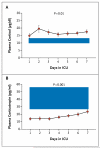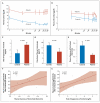Reduced cortisol metabolism during critical illness
- PMID: 23506003
- PMCID: PMC4413428
- DOI: 10.1056/NEJMoa1214969
Reduced cortisol metabolism during critical illness
Abstract
Background: Critical illness is often accompanied by hypercortisolemia, which has been attributed to stress-induced activation of the hypothalamic-pituitary-adrenal axis. However, low corticotropin levels have also been reported in critically ill patients, which may be due to reduced cortisol metabolism.
Methods: In a total of 158 patients in the intensive care unit and 64 matched controls, we tested five aspects of cortisol metabolism: daily levels of corticotropin and cortisol; plasma cortisol clearance, metabolism, and production during infusion of deuterium-labeled steroid hormones as tracers; plasma clearance of 100 mg of hydrocortisone; levels of urinary cortisol metabolites; and levels of messenger RNA and protein in liver and adipose tissue, to assess major cortisol-metabolizing enzymes.
Results: Total and free circulating cortisol levels were consistently higher in the patients than in controls, whereas corticotropin levels were lower (P<0.001 for both comparisons). Cortisol production was 83% higher in the patients (P=0.02). There was a reduction of more than 50% in cortisol clearance during tracer infusion and after the administration of 100 mg of hydrocortisone in the patients (P≤0.03 for both comparisons). All these factors accounted for an increase by a factor of 3.5 in plasma cortisol levels in the patients, as compared with controls (P<0.001). Impaired cortisol clearance also correlated with a lower cortisol response to corticotropin stimulation. Reduced cortisol metabolism was associated with reduced inactivation of cortisol in the liver and kidney, as suggested by urinary steroid ratios, tracer kinetics, and assessment of liver-biopsy samples (P≤0.004 for all comparisons).
Conclusions: During critical illness, reduced cortisol breakdown, related to suppressed expression and activity of cortisol-metabolizing enzymes, contributed to hypercortisolemia and hence corticotropin suppression. The diagnostic and therapeutic implications for critically ill patients are unknown. (Funded by the Belgian Fund for Scientific Research and others; ClinicalTrials.gov numbers, NCT00512122 and NCT00115479; and Current Controlled Trials numbers, ISRCTN49433936, ISRCTN49306926, and ISRCTN08083905.).
Figures




Comment in
-
Adrenal dysfunction in critically ill patients.N Engl J Med. 2013 Apr 18;368(16):1547-9. doi: 10.1056/NEJMe1302305. Epub 2013 Mar 19. N Engl J Med. 2013. PMID: 23506037 No abstract available.
-
Adrenal function: Cortisol metabolism during acute stress--an (IC)U turn.Nat Rev Endocrinol. 2013 Jun;9(6):314. doi: 10.1038/nrendo.2013.72. Epub 2013 Apr 2. Nat Rev Endocrinol. 2013. PMID: 23545486 No abstract available.
-
Reduced cortisol metabolism during critical illness.N Engl J Med. 2013 Aug 1;369(5):481. doi: 10.1056/NEJMc1306703. N Engl J Med. 2013. PMID: 23902491 No abstract available.
-
Reduced cortisol metabolism during critical illness.N Engl J Med. 2013 Aug 1;369(5):479. doi: 10.1056/NEJMc1306703. N Engl J Med. 2013. PMID: 23902492 No abstract available.
-
Reduced cortisol metabolism during critical illness.N Engl J Med. 2013 Aug 1;369(5):479-80. doi: 10.1056/NEJMc1306703. N Engl J Med. 2013. PMID: 23902493 No abstract available.
-
Reduced cortisol metabolism during critical illness.N Engl J Med. 2013 Aug 1;369(5):480. doi: 10.1056/NEJMc1306703. N Engl J Med. 2013. PMID: 23902494 No abstract available.
-
Reduced cortisol metabolism during critical illness.N Engl J Med. 2013 Aug 1;369(5):480-1. doi: 10.1056/NEJMc1306703. N Engl J Med. 2013. PMID: 23902495 No abstract available.
References
-
- Mesotten D, Vanhorebeek I, Van den Berghe G. The altered adrenal axis and treatment with glucocorticoids during critical illness. Nat Clin Pract Endocrinol Metab. 2008;4:496–505. - PubMed
-
- Widmer IE, Puder JJ, König C, et al. Cortisol response in relation to the severity of stress and illness. J Clin Endocrinol Metab. 2005;90:4579–86. - PubMed
-
- Vermes I, Beishuizen A. The hypothalamic-pituitary-adrenal response to critical illness. Best Pract Res Clin Endocrinol Metab. 2001;15:495–511. - PubMed
-
- Annane D, Sébille V, Troché G, Raphael JC, Gajdos P, Bellissant E. A 3-level prognostic classification in septic shock based on cortisol levels and cortisol response to corticotropin. JAMA. 2000;283:1038–45. - PubMed
-
- Annane D, Sébille V, Charpentier C, et al. Effect of treatment with low doses of hydrocortisone and fludrocortisone on mortality in patients with septic shock. JAMA. 2002;288:862–71. - PubMed
- JAMA. 2008;300:1652. Erratum.
Publication types
MeSH terms
Substances
Associated data
Grants and funding
LinkOut - more resources
Full Text Sources
Other Literature Sources
Medical
